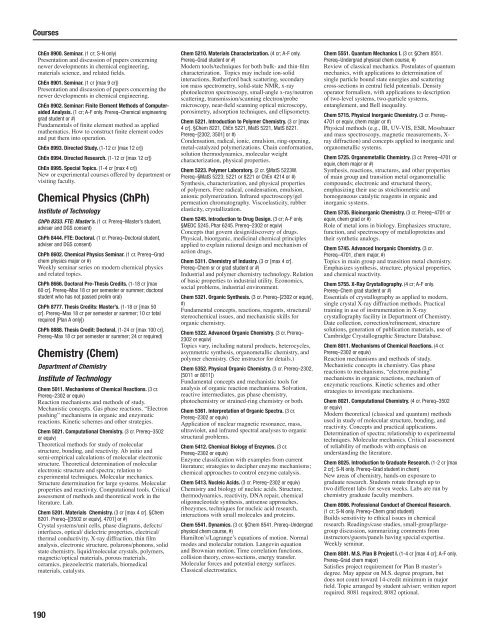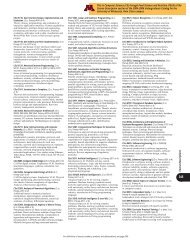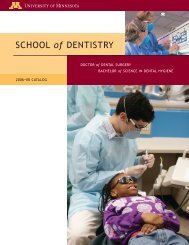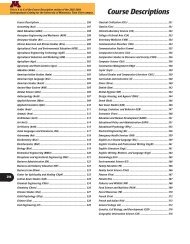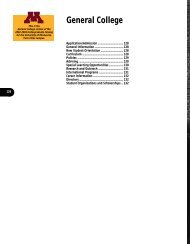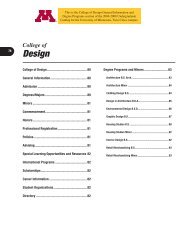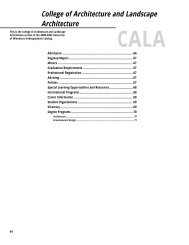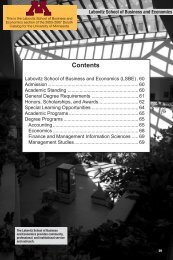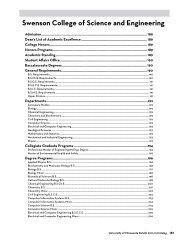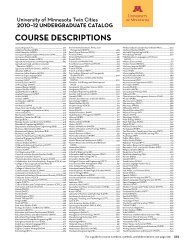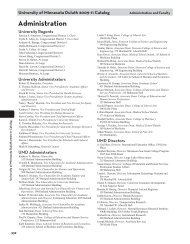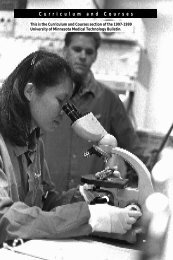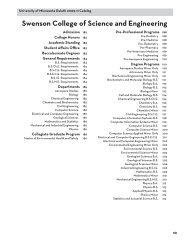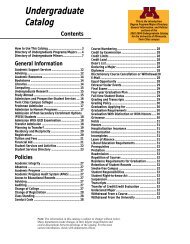Accounting through Education and Human Development - University ...
Accounting through Education and Human Development - University ...
Accounting through Education and Human Development - University ...
You also want an ePaper? Increase the reach of your titles
YUMPU automatically turns print PDFs into web optimized ePapers that Google loves.
Courses<br />
ChEn 8900. Seminar. (1 cr; S-N only)<br />
Presentation <strong>and</strong> discussion of papers concerning<br />
newer developments in chemical engineering,<br />
materials science, <strong>and</strong> related fields.<br />
ChEn 8901. Seminar. (1 cr [max 9 cr])<br />
Presentation <strong>and</strong> discussion of papers concerning the<br />
newer developments in chemical engineering.<br />
ChEn 8902. Seminar: Finite Element Methods of Computeraided<br />
Analysis. (1 cr; A-F only. Prereq–Chemical engineering<br />
grad student or #)<br />
Fundamentals of finite element method as applied<br />
mathematics. How to construct finite element codes<br />
<strong>and</strong> put them into operation.<br />
ChEn 8993. Directed Study. (1-12 cr [max 12 cr])<br />
ChEn 8994. Directed Research. (1-12 cr [max 12 cr])<br />
ChEn 8995. Special Topics. (1-4 cr [max 4 cr])<br />
New or experimental courses offered by department or<br />
visiting faculty.<br />
Chemical Physics (ChPh)<br />
Institute of Technology<br />
ChPh 8333. FTE: Master’s. (1 cr. Prereq–Master’s student,<br />
adviser <strong>and</strong> DGS consent)<br />
ChPh 8444. FTE: Doctoral. (1 cr. Prereq–Doctoral student,<br />
adviser <strong>and</strong> DGS consent)<br />
ChPh 8602. Chemical Physics Seminar. (1 cr. Prereq–Grad<br />
chem physics major or #)<br />
Weekly seminar series on modern chemical physics<br />
<strong>and</strong> related topics.<br />
ChPh 8666. Doctoral Pre-Thesis Credits. (1-18 cr [max<br />
60 cr]. Prereq–Max 18 cr per semester or summer; doctoral<br />
student who has not passed prelim oral)<br />
ChPh 8777. Thesis Credits: Master’s. (1-18 cr [max 50<br />
cr]. Prereq–Max 18 cr per semester or summer; 10 cr total<br />
required [Plan A only])<br />
ChPh 8888. Thesis Credit: Doctoral. (1-24 cr [max 100 cr].<br />
Prereq–Max 18 cr per semester or summer; 24 cr required)<br />
Chemistry (Chem)<br />
Department of Chemistry<br />
Institute of Technology<br />
Chem 5011. Mechanisms of Chemical Reactions. (3 cr.<br />
Prereq–2302 or equiv)<br />
Reaction mechanisms <strong>and</strong> methods of study.<br />
Mechanistic concepts. Gas phase reactions. “Electron<br />
pushing” mechanisms in organic <strong>and</strong> enzymatic<br />
reactions. Kinetic schemes <strong>and</strong> other strategies.<br />
Chem 5021. Computational Chemistry. (3 cr. Prereq–3502<br />
or equiv)<br />
Theoretical methods for study of molecular<br />
structure, bonding, <strong>and</strong> reactivity. Ab initio <strong>and</strong><br />
semi-empirical calculations of molecular electronic<br />
structure. Theoretical determination of molecular<br />
electronic structure <strong>and</strong> spectra; relation to<br />
experimental techniques. Molecular mechanics.<br />
Structure determination for large systems. Molecular<br />
properties <strong>and</strong> reactivity. Computational tools. Critical<br />
assessment of methods <strong>and</strong> theoretical work in the<br />
literature. Lab.<br />
Chem 5201. Materials Chemistry. (3 cr [max 4 cr]. §Chem<br />
8201. Prereq–[[3502 or equiv], 4701] or #)<br />
Crystal systems/unit cells, phase diagrams, defects/<br />
interfaces, optical/ dielectric properties, electrical/<br />
thermal conductivity, X-ray diffraction, thin film<br />
analysis, electronic structure, polarons/phonons, solid<br />
state chemistry, liquid/molecular crystals, polymers,<br />
magnetic/optical materials, porous materials,<br />
ceramics, piezoelectric materials, biomedical<br />
materials, catalysts.<br />
Chem 5210. Materials Characterization. (4 cr; A-F only.<br />
Prereq–Grad student or #)<br />
Modern tools/techniques for both bulk- <strong>and</strong> thin-film<br />
characterization. Topics may include ion-solid<br />
interactions, Rutherford back scattering, secondary<br />
ion mass spectrometry, solid-state NMR, x-ray<br />
photoelectron spectroscopy, small-angle x-ray/neutron<br />
scattering, transmission/scanning electron/probe<br />
microscopy, near-field scanning optical microscopy,<br />
porosimetry, adsorption techniques, <strong>and</strong> ellipsometry.<br />
Chem 5221. Introduction to Polymer Chemistry. (3 cr [max<br />
4 cr]. §Chem 8221, ChEn 5221, MatS 5221, MatS 8221.<br />
Prereq–[2302, 3501] or #)<br />
Condensation, radical, ionic, emulsion, ring-opening,<br />
metal-catalyzed polymerizations. Chain conformation,<br />
solution thermodynamics, molecular weight<br />
characterization, physical properties.<br />
Chem 5223. Polymer Laboratory. (2 cr. §MatS 5223W.<br />
Prereq–§MatS 5223; 5221 or 8221 or ChEn 4214 or #)<br />
Synthesis, characterization, <strong>and</strong> physical properties<br />
of polymers. Free radical, condensation, emulsion,<br />
anionic polymerization. Infrared spectroscopy/gel<br />
permeation chromatography. Viscoelasticity, rubber<br />
elasticity, crystallization.<br />
Chem 5245. Introduction to Drug Design. (3 cr; A-F only.<br />
§MEDC 5245, Phar 6245. Prereq–2302 or equiv)<br />
Concepts that govern design/discovery of drugs.<br />
Physical, bioorganic, medicinal chemical principles<br />
applied to explain rational design <strong>and</strong> mechanism of<br />
action drugs.<br />
Chem 5311. Chemistry of Industry. (3 cr [max 4 cr].<br />
Prereq–Chem sr or grad student or #)<br />
Industrial <strong>and</strong> polymer chemistry technology. Relation<br />
of basic properties to industrial utility. Economics,<br />
social problems, industrial environment.<br />
Chem 5321. Organic Synthesis. (3 cr. Prereq–[2302 or equiv],<br />
#)<br />
Fundamental concepts, reactions, reagents, structural/<br />
stereochemical issues, <strong>and</strong> mechanistic skills for<br />
organic chemistry.<br />
Chem 5322. Advanced Organic Chemistry. (3 cr. Prereq–<br />
2302 or equiv)<br />
Topics vary, including natural products, heterocycles,<br />
asymmetric synthesis, organometallic chemistry, <strong>and</strong><br />
polymer chemistry. (See instructor for details.)<br />
Chem 5352. Physical Organic Chemistry. (3 cr. Prereq–2302,<br />
[5011 or 8011])<br />
Fundamental concepts <strong>and</strong> mechanistic tools for<br />
analysis of organic reaction mechanisms. Solvation,<br />
reactive intermediates, gas phase chemistry,<br />
photochemistry or strained-ring chemistry or both.<br />
Chem 5361. Interpretation of Organic Spectra. (3 cr.<br />
Prereq–2302 or equiv)<br />
Application of nuclear magnetic resonance, mass,<br />
ultraviolet, <strong>and</strong> infrared spectral analyses to organic<br />
structural problems.<br />
Chem 5412. Chemical Biology of Enzymes. (3 cr.<br />
Prereq–2302 or equiv)<br />
Enzyme classification with examples from current<br />
literature; strategies to decipher enzyme mechanisms;<br />
chemical approaches to control enzyme catalysis.<br />
Chem 5413. Nucleic Acids. (3 cr. Prereq–2302 or equiv)<br />
Chemistry <strong>and</strong> biology of nucleic acids. Structure,<br />
thermodynamics, reactivity, DNA repair, chemical<br />
oligonucleotide synthesis, antisense approaches,<br />
ribozymes, techniques for nucleic acid research,<br />
interactions with small molecules <strong>and</strong> proteins.<br />
Chem 5541. Dynamics. (3 cr. §Chem 8541. Prereq–Undergrad<br />
physical chem course, #)<br />
Hamiltonʼs/Lagrangeʼs equations of motion. Normal<br />
modes <strong>and</strong> molecular rotation. Langevin equation<br />
<strong>and</strong> Brownian motion. Time correlation functions,<br />
collision theory, cross-sections, energy transfer.<br />
Molecular forces <strong>and</strong> potential energy surfaces.<br />
Classical electrostatics.<br />
Chem 5551. Quantum Mechanics I. (3 cr. §Chem 8551.<br />
Prereq–Undergrad physical chem course, #)<br />
Review of classical mechanics. Postulates of quantum<br />
mechanics, with applications to determination of<br />
single particle bound state energies <strong>and</strong> scattering<br />
cross-sections in central field potentials. Density<br />
operator formalism, with applications to description<br />
of two-level systems, two-particle systems,<br />
entanglement, <strong>and</strong> Bell inequality.<br />
Chem 5715. Physical Inorganic Chemistry. (3 cr. Prereq–<br />
4701 or equiv, chem major or #)<br />
Physical methods (e.g., IR, UV-VIS, ESR, Mossbauer<br />
<strong>and</strong> mass spectroscopy, magnetic measurements, X-<br />
ray diffraction) <strong>and</strong> concepts applied to inorganic <strong>and</strong><br />
organometallic systems.<br />
Chem 5725. Organometallic Chemistry. (3 cr. Prereq–4701 or<br />
equiv, chem major or #)<br />
Synthesis, reactions, structures, <strong>and</strong> other properties<br />
of main group <strong>and</strong> transition metal organometallic<br />
compounds; electronic <strong>and</strong> structural theory,<br />
emphasizing their use as stoichiometric <strong>and</strong><br />
homogeneous catalytic reagents in organic <strong>and</strong><br />
inorganic systems.<br />
Chem 5735. Bioinorganic Chemistry. (3 cr. Prereq–4701 or<br />
equiv, chem grad or #)<br />
Role of metal ions in biology. Emphasizes structure,<br />
function, <strong>and</strong> spectroscopy of metalloproteins <strong>and</strong><br />
their synthetic analogs.<br />
Chem 5745. Advanced Inorganic Chemistry. (3 cr.<br />
Prereq–4701, chem major, #)<br />
Topics in main group <strong>and</strong> transition metal chemistry.<br />
Emphasizes synthesis, structure, physical properties,<br />
<strong>and</strong> chemical reactivity.<br />
Chem 5755. X-Ray Crystallography. (4 cr; A-F only.<br />
Prereq–Chem grad student or #)<br />
Essentials of crystallography as applied to modern,<br />
single crystal X-ray diffraction methods. Practical<br />
training in use of instrumentation in X-ray<br />
crystallography facility in Department of Chemistry.<br />
Date collection, correction/refinement, structure<br />
solutions, generation of publication materials, use of<br />
Cambridge Crystallographic Structure Database.<br />
Chem 8011. Mechanisms of Chemical Reactions. (4 cr.<br />
Prereq–2302 or equiv)<br />
Reaction mechanisms <strong>and</strong> methods of study.<br />
Mechanistic concepts in chemistry. Gas phase<br />
reactions to mechanisms, “electron pushing”<br />
mechanisms in organic reactions, mechanism of<br />
enzymatic reactions. Kinetic schemes <strong>and</strong> other<br />
strategies to investigate mechanisms.<br />
Chem 8021. Computational Chemistry. (4 cr. Prereq–3502<br />
or equiv)<br />
Modern theoretical (classical <strong>and</strong> quantum) methods<br />
used in study of molecular structure, bonding, <strong>and</strong><br />
reactivity. Concepts <strong>and</strong> practical applications.<br />
Determination of spectra; relationship to experimental<br />
techniques. Molecular mechanics. Critical assessment<br />
of reliability of methods with emphasis on<br />
underst<strong>and</strong>ing the literature.<br />
Chem 8025. Introduction to Graduate Research. (1-2 cr [max<br />
2 cr]; S-N only. Prereq–Grad student in chem)<br />
New areas of chemistry, h<strong>and</strong>s-on exposure to<br />
graduate research. Students rotate <strong>through</strong> up to<br />
two different labs for seven weeks. Labs are run by<br />
chemistry graduate faculty members.<br />
Chem 8066. Professional Conduct of Chemical Research.<br />
(1 cr; S-N only. Prereq–Chem grad student)<br />
Builds sensitivity to ethical issues in chemical<br />
research. Readings/case studies, small-group/largegroup<br />
discussion, summarizing comments from<br />
instructors/guests/panels having special expertise.<br />
Weekly seminar.<br />
Chem 8081. M.S. Plan B Project I. (1-4 cr [max 4 cr]; A-F only.<br />
Prereq–Grad chem major)<br />
Satisfies project requirement for Plan B masterʼs<br />
degree. May appear on M.S. degree program, but<br />
does not count toward 14-credit minimum in major<br />
field. Topic arranged by student adviser; written report<br />
required. 8081 required; 8082 optional.<br />
190


